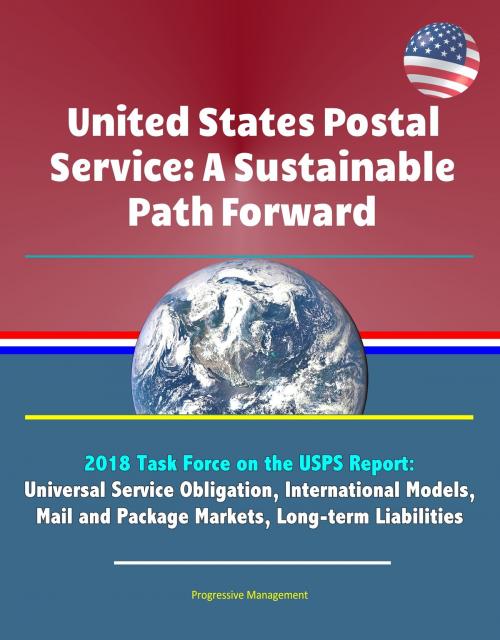United States Postal Service: A Sustainable Path Forward - 2018 Task Force on the USPS Report: Universal Service Obligation, International Models, Mail and Package Markets, Long-term Liabilities
Business & Finance, Marketing & Sales, Commerce, Nonfiction, Social & Cultural Studies, Political Science, Government| Author: | Progressive Management | ISBN: | 9780463958384 |
| Publisher: | Progressive Management | Publication: | May 10, 2019 |
| Imprint: | Smashwords Edition | Language: | English |
| Author: | Progressive Management |
| ISBN: | 9780463958384 |
| Publisher: | Progressive Management |
| Publication: | May 10, 2019 |
| Imprint: | Smashwords Edition |
| Language: | English |
This unique report issued in December 2018 has been professionally converted for accurate flowing-text e-book format reproduction. The Task Force's review of the U.S. Postal System identified significant opportunities for reform that would enable the USPS to operate a sustainable business model and compete fairly in competitive markets. The Task Force considered both administrative and legislative reforms that take into account changes in the postal industry, the USPS's competitive advantages, and areas requiring improvement through either government or private sector-driven initiatives. This report provides options that should be considered, in whole or in part, as the USPS and other stakeholders work to evolve the USPS's business model and restore it to the long-term sustainability demanded of it by the American people. The Task Force also considered the USPS's particular importance to rural and remote locations within the United States, recognizing the USPS's role in the U.S. economy, as both a service provider and employer. The USPS provides postal services across all regions and is one of our nation's largest employers, with employees in nearly every community in the country. The Task Force strongly believes that any potential solutions considered should not disadvantage those living in rural or remote locations.
This compilation includes a reproduction of the 2019 Worldwide Threat Assessment of the U.S. Intelligence Community.
- Executive Summary * A. Task Force on the United States Postal System * B. Unsustainable Financial Path * C. Scope of Work * D. Summary of Recommendations * 2. Introduction * A. History of the United States Postal Service * B. Role of the USPS in the Economy * C. Current State of the USPS * D. International Postal Models * 3. Mission and Business Model * A. Historical Business Model * B. Creation of a New Business Model * 4. Universal Service Obligation * A. Overview * B. Background * C. Findings and Recommendations * 5. Mail and Package Markets * A. Overview * B. Background * C. Findings And Recommendations * 6. Operational Structure, Governance, and Long-term Liabilities * A. Overview * B. Background * C. Findings and Recommendations
The USPS suffers from a lack of institutional governance. The USPS's Governors are considered the "head of the agency" and are responsible for directing and controlling the USPS. Between December 2016 and August 2018, the USPS Board of Governors (the Board) had no Governors. In August 2018, the Senate confirmed two Governors — the first Governors confirmed by the Senate since 2010. Without Governors, the Postmaster General managed the USPS's financial and operational challenges without strategic direction and guidance, exacerbating management's limited power to effect needed organizational change. The Board should move to create a new policy mandate that resets the USPS's organizational direction and develops financial targets for the USPS. Governance should be strengthened with expanded Board controls and increased accountability. Moreover, if the USPS is unable to achieve a sustainable business model and satisfy its financial commitments, including those to other federal agencies, the PRC should be given stronger regulatory authority to take necessary revenue and expense measures.
This unique report issued in December 2018 has been professionally converted for accurate flowing-text e-book format reproduction. The Task Force's review of the U.S. Postal System identified significant opportunities for reform that would enable the USPS to operate a sustainable business model and compete fairly in competitive markets. The Task Force considered both administrative and legislative reforms that take into account changes in the postal industry, the USPS's competitive advantages, and areas requiring improvement through either government or private sector-driven initiatives. This report provides options that should be considered, in whole or in part, as the USPS and other stakeholders work to evolve the USPS's business model and restore it to the long-term sustainability demanded of it by the American people. The Task Force also considered the USPS's particular importance to rural and remote locations within the United States, recognizing the USPS's role in the U.S. economy, as both a service provider and employer. The USPS provides postal services across all regions and is one of our nation's largest employers, with employees in nearly every community in the country. The Task Force strongly believes that any potential solutions considered should not disadvantage those living in rural or remote locations.
This compilation includes a reproduction of the 2019 Worldwide Threat Assessment of the U.S. Intelligence Community.
- Executive Summary * A. Task Force on the United States Postal System * B. Unsustainable Financial Path * C. Scope of Work * D. Summary of Recommendations * 2. Introduction * A. History of the United States Postal Service * B. Role of the USPS in the Economy * C. Current State of the USPS * D. International Postal Models * 3. Mission and Business Model * A. Historical Business Model * B. Creation of a New Business Model * 4. Universal Service Obligation * A. Overview * B. Background * C. Findings and Recommendations * 5. Mail and Package Markets * A. Overview * B. Background * C. Findings And Recommendations * 6. Operational Structure, Governance, and Long-term Liabilities * A. Overview * B. Background * C. Findings and Recommendations
The USPS suffers from a lack of institutional governance. The USPS's Governors are considered the "head of the agency" and are responsible for directing and controlling the USPS. Between December 2016 and August 2018, the USPS Board of Governors (the Board) had no Governors. In August 2018, the Senate confirmed two Governors — the first Governors confirmed by the Senate since 2010. Without Governors, the Postmaster General managed the USPS's financial and operational challenges without strategic direction and guidance, exacerbating management's limited power to effect needed organizational change. The Board should move to create a new policy mandate that resets the USPS's organizational direction and develops financial targets for the USPS. Governance should be strengthened with expanded Board controls and increased accountability. Moreover, if the USPS is unable to achieve a sustainable business model and satisfy its financial commitments, including those to other federal agencies, the PRC should be given stronger regulatory authority to take necessary revenue and expense measures.















